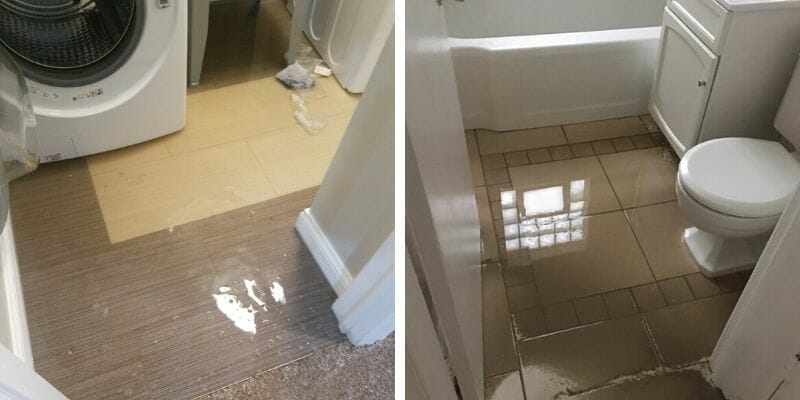The Causes of Moisture Harm in the Bathroom
The Causes of Moisture Harm in the Bathroom
Blog Article
Almost everyone has got their own theory about How to Repair and Prevent Bathroom Water Damage?.

Water damage commonly occurs in the shower room due to the water used daily. Sometimes, the damage could be a little mold and mildew from the shower. Various other times, it's large damage on your floor. Whatever it is, it is always excellent to understand the cause as well as avoid it before it takes place.
This overview will go through several of the typical causes of water damage in the bathroom. We will also analyze what you can do to stop these reasons from damaging your restroom. Let's dive in.
These are the common reasons you would have water damage in your washrooms as well as how you can spot them:
Excess Dampness
It's amazing to have that long shower and dash water while you dance around and imitate you're carrying out, yet often these acts could create water damage to your shower room.
Sprinkling water around can cause water to visit corners and also form mold and mildews. View just how you spread excess moisture around, as well as when you do it, clean it up to avoid damages.
Fractures in your wall surface tiles
Shower room wall surface tiles have been specifically designed for that function. They secure the wall surface from moisture from people taking showers. Nevertheless, they are not undestroyable.
Sometimes, your restroom wall floor tiles crack and permit some wetness to permeate into the wall surface. This could potentially damage the wall surface if you don't take any kind of activity. If you see a crack on your wall ceramic tiles, repair it immediately. Do not wait till it destroys your wall surface.
Overruning bathrooms and also sinks
As people, occasionally we make blunders that might cause some water damage in the shower room. As an example, leaving your sink tap on could trigger overruning and damages to various other parts of the bathroom with wetness.
Additionally, a faulty toilet might create overruning. For example, a damaged toilet deal with or various other parts of the tank. When this takes place, it could damage the floor.
As soon as you observe an overruning sink or bathroom, call a plumbing professional to help handle it promptly.
Ruptured or Dripping Pipelines
There are several pipelines carrying water to various parts of your restroom. Some pipes take water to the bathroom, the sink, the faucets, the shower, as well as numerous various other locations. They crisscross the small area of the bathroom.
Every so often, these pipes might get rusty and burst. Other times, human activity could cause them to leakage. When this takes place, you'll locate water in the edges of your washroom or on the wall surface.
To identify this, watch out for bubbling walls, molds, or mildew. Call a professional emergency plumber to repair this when it takes place.
Roof covering Leakages
Often, the issue of water damage to the shower room may not come from the restroom. For example, a roof leakage might cause damages to the bathroom ceiling. You can detect the damage done by taking a look at the water spots on the ceiling.
If you find water discolorations on your ceiling, inspect the roofing system to see if it's damaged. After that, call a specialist to assist resolve the concern.
Verdict
Water damage to your restroom can be irritating. However, you can manage it if you avoid some of the reasons pointed out in this guide. Call a specialist emergency situation plumbing if you see any type of severe damages.
How to Prevent Water Damage in Your Bathroom?
Water damage repair is an expensive, meticulous, and lengthy process. Unfortunately, bathrooms are the most susceptible rooms to water damage due to toilets, showers, and sinks. Pipes and fixtures wear out over time and are not immune to damage. But all is not lost, as there are ways to prevent water damage from occurring in your bathroom.
Check Your Plumbing
Nothing lasts forever, especially pipes, which can rust and begin leaking over time. You should periodically conduct pipe inspections and pay attention for any musty smells or water stains that may indicate you need water damage repair. Here are some things to check:
Frequently test valves for your toilet, shower, and sink to ensure they are properly working. Check faucet supply lines hidden under vanities and replace when needed. Replace cracked or deteriorating caulking along sinks, tubs, and showers. If you notice a clog in your sink, call in a professional. Since you can’t check the pipes in the wall, keep an eye out for stains, drywall bubbling, musty smells, and excess moisture; if the bathroom is on a second level, check the ceiling of the room directly below for these signs. Don’t Overwork Your Toilet
One of the most common reasons bathrooms need water damage repair is due to overflowing toilets. Save yourself the hassle of cleanup by being mindful and not pushing your toilet to extreme limits. If you have young children, it is especially important to keep an eye on them when they are in the bathroom and to teach them how to avoid clogging the toilet. Here are some more tips to help prevent your toilet from overflowing:
If you have a septic tank, only use septic-safe toilet paper Do not flush anything down the toilet besides toilet paper; items like diapers and sanitary napkins will clog the piping Pay attention to your toilet’s water level: If it’s low, it could mean it is partially clogged or that there is a crack in the toilet bowl https://www.alure.com/home-improvements-blog/resources/how-to-prevent-water-damage-in-your-bathroom

I hope you enjoyed reading our topic on How to Repair and Prevent Bathroom Water Damage?. Thanks so much for spending some time to browse our piece. Sharing is caring. Helping others is fun. Thank you for taking the time to read it.
Hot water gone? Dial here. Report this page